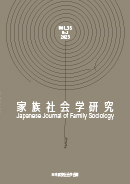Current issue
Displaying 1-14 of 14 articles from this issue
- |<
- <
- 1
- >
- >|
Essay
-
2023 Volume 35 Issue 2 Pages 109-110
Published: October 31, 2023
Released on J-STAGE: November 21, 2023
Download PDF (172K)
Article
-
2023 Volume 35 Issue 2 Pages 111-123
Published: October 31, 2023
Released on J-STAGE: November 21, 2023
Download PDF (489K)
Special Issues A Summary of Professor Kiyomi Morioka's Family Sociology and Its Implications for Contemporary Family Research
-
2023 Volume 35 Issue 2 Pages 124-128
Published: October 31, 2023
Released on J-STAGE: November 21, 2023
Download PDF (232K) -
2023 Volume 35 Issue 2 Pages 129-137
Published: October 31, 2023
Released on J-STAGE: November 21, 2023
Download PDF (357K) -
2023 Volume 35 Issue 2 Pages 138-145
Published: October 31, 2023
Released on J-STAGE: November 21, 2023
Download PDF (321K) -
2023 Volume 35 Issue 2 Pages 146-157
Published: October 31, 2023
Released on J-STAGE: November 21, 2023
Download PDF (373K) -
2023 Volume 35 Issue 2 Pages 158-170
Published: October 31, 2023
Released on J-STAGE: November 21, 2023
Download PDF (405K)
NFRJ Corner
-
2023 Volume 35 Issue 2 Pages 171-178
Published: October 31, 2023
Released on J-STAGE: November 21, 2023
Download PDF (326K)
Book Reviews
-
2023 Volume 35 Issue 2 Pages 179-180
Published: October 31, 2023
Released on J-STAGE: November 21, 2023
Download PDF (185K) -
2023 Volume 35 Issue 2 Pages 181-182
Published: October 31, 2023
Released on J-STAGE: November 21, 2023
Download PDF (147K)
Book Reviews
-
2023 Volume 35 Issue 2 Pages 183
Published: October 31, 2023
Released on J-STAGE: November 21, 2023
Download PDF (126K) -
2023 Volume 35 Issue 2 Pages 184
Published: October 31, 2023
Released on J-STAGE: November 21, 2023
Download PDF (127K) -
2023 Volume 35 Issue 2 Pages 185
Published: October 31, 2023
Released on J-STAGE: November 21, 2023
Download PDF (137K) -
2023 Volume 35 Issue 2 Pages 186
Published: October 31, 2023
Released on J-STAGE: November 21, 2023
Download PDF (136K)
- |<
- <
- 1
- >
- >|
